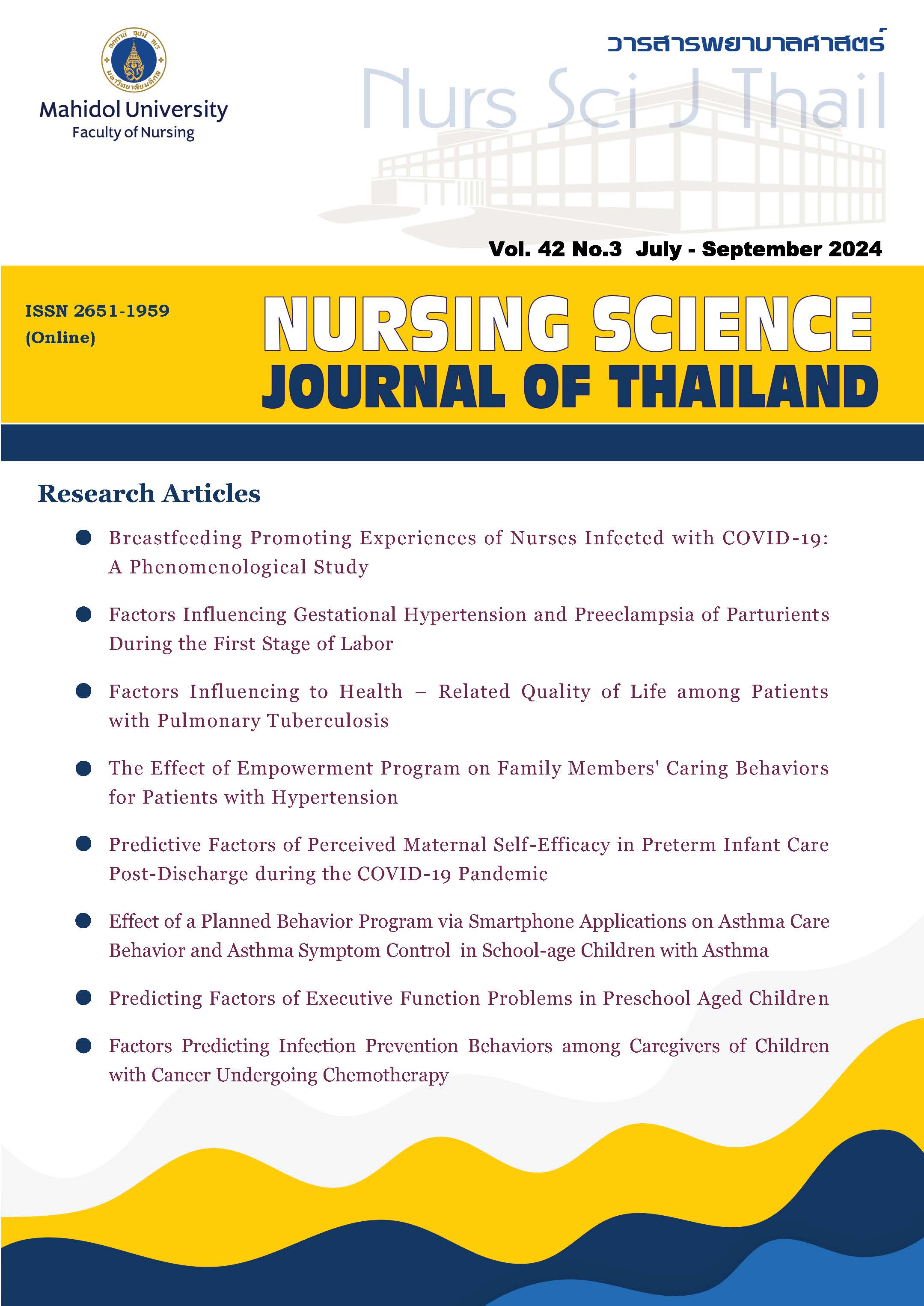The Effect of Empowerment Program on Family Members' Caring Behaviors for Patients with Hypertension
Main Article Content
Abstract
Purpose: To study the effects of a family member empowerment program on family members’ caring behaviors for patients with hypertension.
Design: Quasi-experimental.
Methods: The sample was consisted of 86 family members mainly responsible for the care of patients with hypertension living in communities, Bangkok, divided into experimental and control groups with 43 each. The experimental group received the empowerment program applied from Gibson’s empowerment concept, which contained the following activities: discovering the reality by exchanging experiences of care among caregivers, obtaining advices through handbook and short video clips about care for patients with hypertension, and receiving phone calls encouraging proper decision making and practices in care with respect to dietary intake, exercise, medication adherence, stress relief, and keeping appointments. Moreover, 6 short messages and 4 callings were offered to the experimental group for maintaining efficient practice. The control group received home visit and general health education. Caring behaviors were assessed before and 8 weeks after the program. Data were collected by using a demographic questionnaire, a questionnaire on family members’ perceived empowerment, and a questionnaire on caring behavior for patients with hypertension. Data were analyzed using independent t-test and paired t-test.
Main findings: After participating in the program, the experimental group had significantly higher mean scores of caring behaviors for patients with hypertension than the control group (t(84) = 10.75, p < .001). Compared to means scores of family members’ caring behaviors for patients with hypertension in the experimental group prior to the program, the scores after the program were significantly higher (t(42) = 10.28, p < .001).
Conclusion and recommendations: The empowerment program was effective in improving family members' caring behaviors for patients with hypertension. An empowerment program should be designed for both patients with hypertension and their family members. Moreover, the program should be adapted for family members in caring for patients with others chronic diseases.
Article Details

This work is licensed under a Creative Commons Attribution-NonCommercial-NoDerivatives 4.0 International License.
Copyright Notice: Nursing Science Journal of Thailand has exclusive rights to publish and distribute the manuscript and all contents therein. Without the journal’s permission, the dissemination of the manuscript in another journal or online, and the reproduction of the manuscript for non-educational purpose are prohibited.

Disclaimer: The opinion expressed and figures provided in this journal, NSJT, are the sole responsibility of the authors. The editorial board bears no responsibility in this regard.
References
Thai Hypertension Society. Thai guidelines on the treatment of hypertension [Internet]. Bangkok: Thai Hypertension Society; 2019 [cited 2021 Nov 10]. Available from: http://www.thaihypertension.org/guideline.html.pdf. (in Thai).
World Health Organization. Key facts of hypertension [Internet]. Geneva: World Health Organization; 2023 [cited 2023 Aug 10]. Available from: https://www.who.int/news-room/fact-sheets/detail/hypertension.
Strategy and Planning Division, Office of the Permanent Secretary, Ministry of Public Health. Number and mortality rate due to hypertension per 100,000 population in the year 2017-2021, classified by province, public health service area and country overview [Internet]. Nonthaburi: Division of Non Communicable Diseases; 2023 [cited 2023 Aug 10]. Available from: http://www.thaincd.com/2016/mission/documents-detail.php?id=14480&tid=32&gid=1-020. (in Thai).
Surakan P, Jongudomkarn D. The family caregiver’s roles in providing care for chronically the ill family members: a synthesis of qualitative research thesis. Journal of The Office of DPC 7 Khon Kaen. 2019;26(2):83-92. (in Thai).
Baiya N, Chumsaeng C, Phaechaiyaphum N, Tangsangwornthamma C. The effects of family nursing intervention program based on the illness belief model on the health behaviors of the hypertensive patients and health care behaviors of their family [research article]. Nakhon Nayok: HRH Princess Maha Chakri Sirindhorn Medical Center, Faculty of Medicine, Srinakharinwirot University; 2013. 106 p. (in Thai).
Seesawang J, Thongtaeng P, Naimkerd P, Tantaphoprasit J. Family participation: a strategy for encouraging treatment adherence among older persons with uncontrolled hypertension. Ramathibodi Nursing Journal. 2022;28(2):159-69. (in Thai).
Komkai S. Empowering caregivers of patients with hypertension at Srisuk Subdistrict, Srinarong District, Surin Province [master’s thesis]. Khon Kaen: Khon Kaen University; 2009. 64 p. (in Thai).
Setyoadi S, Seda LFS, Lestari P, Irwando E, Nurani N, Hayati YS, et al. Family empowerment as nursing intervention for families with type 2 diabetes mellitus: a literature review. Journal of Indonesian Community Health. 2023;3(3):267-80. doi: 10.58545/jkki.v3i3.203.
Yimyam N, Rodjarkpai Y. Effect of empowerment program of caregiver caring for the elderly at risk of high blood pressure in Kaengdinso Sub-District, Nadee District, Prachinburi Province. Journal of the Office of DPC 7 Khon Kaen. 2017;24(2):46-58. (in Thai).
Gibson CH. The process of empowerment in mothers of chronically ill children. J Adv Nurs. 1995;21(6):1201-10. doi: 10.1046/j.1365-2648.1995.21061201.x.
Santumma P. The effect of family empowerment on the empowerment of caring for primary hypertension aging [master’s thesis]. Khon Kaen: Khon Kaen University; 2009. 166 p. (in Thai).
Attaprajong J, Jewpattanakul Y, Krainuwut K. Effects of family members’ empowerment program on family members’ food preparing behaviors for elderly diabetic patients. Chulalongkorn Medical Journal. 2020;64(1):87-94. doi: 10.14456/clmj.2020.13.
Pansanae N, Jewpattanakul Y, Rerkluenrit J. The effect of primary family caregiver empowerment program on the activity of daily living caring behaviors of cerebrovascular disease homebound patients in community, Bangkok. Journal of The Royal Thai Army Nurses. 2023;24(2):190-8. (in Thai).
Miller JF. Coping with chronic illness: overcoming powerlessness. 2nd ed. Philadelphia: F.A. Davis; 1992. 442 p.
Burns N, Grove S. The practice of nursing research: appraisal, synthesis and generation of evidence. 6th ed. St. Louis: Saunders Elsevier; 2009. 752 p.
Polit DF, Beck CT. International differences in nursing research, 2005-2006. J Nurs Scholarsh. 2009;41(1):44–53. doi: 10.1111/j.1547-5069.2009.01250.x.
Bawornthip P, Aungwattana S, Sripetchwandee N. The relationship between personal factors, health literacy, and health behaviors among uncontrolled hypertensive patients in Muang District, Chiang Mai Province. Nursing Journal CMU. 2023;50(1):284-99. (in Thai).
Thongsuk W, Tipwareerom W, Supametaporn P. Effects of empowerment program on health behaviors, body mass index and blood pressure levels in patients with uncontrolled hypertension. Nursing Journal CMU. 2020;47(4):229-41. (in Thai).


